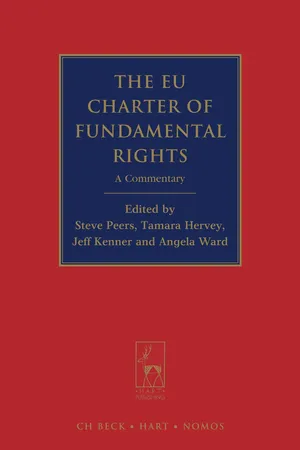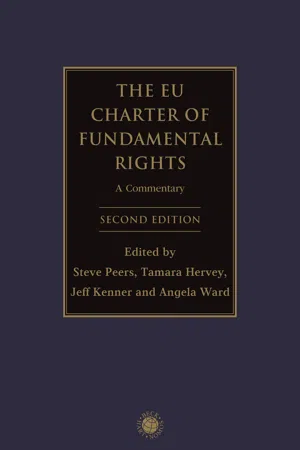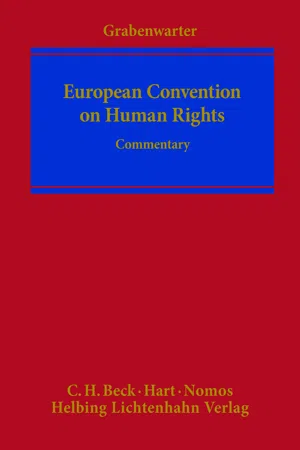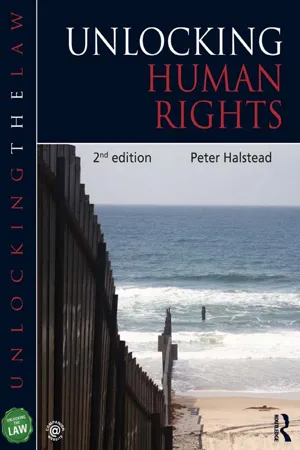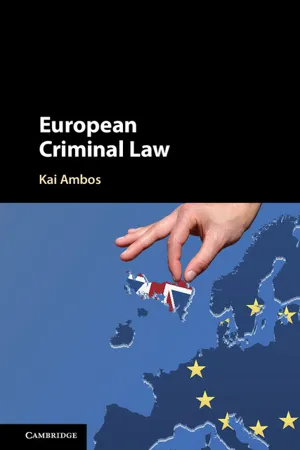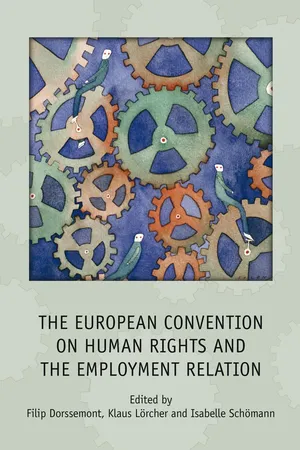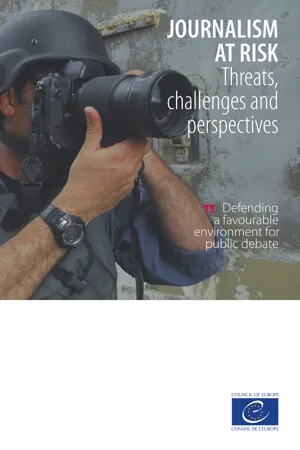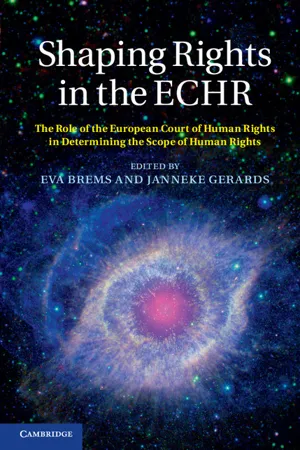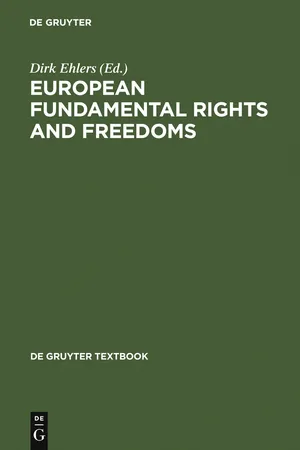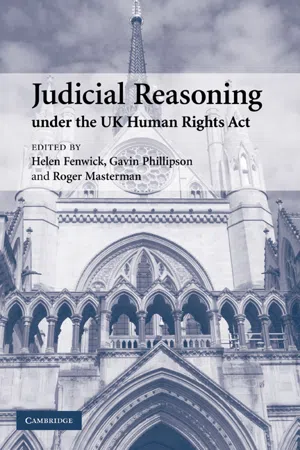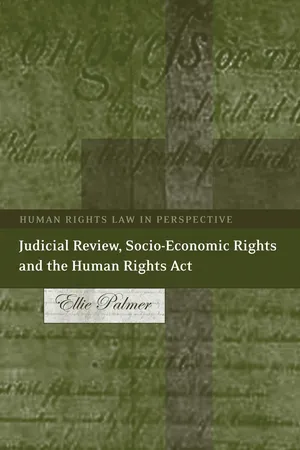Law
Article 10 echr
Article 10 of the European Convention on Human Rights (ECHR) protects the right to freedom of expression, including the freedom to hold opinions and receive and impart information and ideas without interference from public authorities. This right is subject to certain restrictions that are necessary in a democratic society, such as for the protection of national security, public safety, or the prevention of disorder or crime.
Written by Perlego with AI-assistance
Related key terms
1 of 5
11 Key excerpts on "Article 10 echr"
- eBook - PDF
The EU Charter of Fundamental Rights
A Commentary
- Steve Peers, Tamara Hervey, Jeff Kenner, Angela Ward, Steve Peers, Tamara Hervey, Jeff Kenner, Angela Ward(Authors)
- 2014(Publication Date)
- Hart/Beck(Publisher)
56 Hashman and Harrup v UK App no 25594/94, Reports of Judgments and Decisions 1999-VIII, (2000) EHRR 24, who disrupted a hunt by blowing a horn and hallooing. 57 Young, James and Webster v UK Report 14 December 1979, B.39 (1984), p 48; K v Austria Report of 13 October 1992, A.255-B, p 38. 58 De Haes and Gijsels v Belgium App no 7/1996/626/809/1996/626 (Judgment 24 February 1997) [48] 59 Case C-316/09 MSD Sharp & Dohme GmbH (n 44) [AG81]. 60 Yildirim v Turkey App no 3111/10 (Judgment 18 December 2012); Delphi AS v Estonia App no 64569/09 (Judgment 10 October 2013). 11.25 11.26 11.27 322 Lorna Woods Part I – Commentary on the Articles of the EU Charter ECHR). 61 The European Court of Human Rights in the Pirate Bay decision, 62 which concerned a claim by those providing a file-sharing site and who specifically disassoci-ated themselves from the content shared, reiterated both the importance of the Internet and the fact that ‘Article 10 applies not only to the content of the information but also to the means of transmission or reception’. So Article 10 seemingly applies to those provid-ing software and services as well as infrastructure. As regards content, Advocate General Cruz Villalón noted in eDate that the content of freedom of expression, although recognised by the EU courts, has been delineated more specifically under Article 10. 63 Thus Article 11 EUCFR will be similarly a broad right. 64 Freedom of expression covers political, cultural and artistic speech as well as commercial communications; 65 the frivolous and humorous, as well as the serious. It ‘gives everyone the right to express opinions, however questionable or shocking, minor-ity or extravagant they may be’. - eBook - ePub
The EU Charter of Fundamental Rights
A Commentary
- Steve Peers, Tamara Hervey, Jeff Kenner, Angela Ward, Steve Peers, Tamara Hervey, Jeff Kenner, Angela Ward(Authors)
- 2021(Publication Date)
- Hart/Beck(Publisher)
Article 18 of the Universal Declaration of Human Rights, 66 Article 18 of the International Covenant on Civil and Political Rights 67 and Article 1 of the United Nations Declaration on the Elimination of All Forms of Intolerance and of Discrimination Based on Religion or Belief 68 all endorse freedom of religion and conscience in remarkably similar terms to Article 10 of the Charter. The Refugee Convention recognises persecution on religious grounds as a basis for asylum (Article 1). 69 10.30 However, as noted above, by far the greatest source of law for Article 10 of the Charter is Article 9 of the ECHR and the jurisprudence of the ECtHR related to it. The explanatory text that accompanies the Charter, as we have seen, makes it clear that Article 10 is intended to have the same meaning as Article 9. Furthermore, given the importance attached by the CJEU to the ECHR in determining the content of the ‘general principles of law’ which have been a feature of the Court of Justice’s jurisprudence for over 40 years and which continue to constitute an element of EU fundamental rights, the Convention’s approach to freedom of conscience and religion will be a major determinant of the content of Article 10 of the Charter. 10.31 Finally, EU legislation may also be relevant to the rights protected by Article 10 (particularly Directive 2000/78 but also legislation in a range of other areas such as animal welfare 70). Such legislation does not amend or qualify the text of Article 10 but may provide a background of norms which may inform the meaning attributed to the Article by the Court of Justice - eBook - PDF
European Convention on Human Rights
Commentary
- Christoph Grabenwarter(Author)
- 2014(Publication Date)
- Beck/Hart(Publisher)
Its incorporation in the Convention goes back to the concept of Contempt of Court as known in common law systems. The rights so protected are the rights of individuals in their capacity as litigants, that is as persons involved in the machinery of justice, and the authority of that machinery will not be maintained unless protection is afforded to all those involved in or having recourse to it. 108 102 ECtHR, 2/8/2000, Bergens Tidende a. o. v NOR, No. 26132/95, §§ 53 et seq; ECtHR, 14/10/2008, Petrina v ROM, No. 78060/01, §§ 31 et seq. 103 ECtHR, 8/10/2009, Romanenko a. o. v RUS, No. 11751/03, § 39; against this the joint concurring opinion of judges Spielman and Malinverni . 104 ECtHR, 19/7/2011, UJ v HUN, No. 23954/10, § 22. 105 ECtHR, 20/9/1994, Otto Preminger Institut v AUT, No. 13470/87, §§ 46–48. 106 ECtHR, 25/4/2006, Dammann v SUI, No. 77551/01, § 38. 107 ECtHR, 10/12/2007 (GC), Stoll v SUI, No. 69698/01, §§ 57 et seq. 108 See ECtHR, 26/4/1979, Sunday Times (No.1) v UK, No. 6538/74, § 56. IV. Justification 26, 27 Art. 10 265 3. Necessary in a democratic society 28 For the justification of interferences the freedom of expression is closely related to the concept of a democratic society. According to the Court, freedom of expression constitutes one of the essential foundations of such a society, one of the basic conditions for its progress and for the development of every man. It is applicable not only to ‘ information ’ or ‘ ideas ’ that are favourably received or regarded as inoffensive or as a matter of indifference, but also to those that offend, shock or disturb the State or any sector of the population. 109 The Court held that ill feelings or even outrage, in the absence of intimidation, cannot represent a pressing social need for the purposes of Article 10 (2). 110 It is remarkable that at the very beginning of Article 10 (2) the duties and responsibilities it carries with it are mentioned. - eBook - ePub
- Peter Halstead(Author)
- 2014(Publication Date)
- Routledge(Publisher)
2. What do you think might be the reason(s) for the additional criteria and restrictions the European Convention Article 10 and the European Charter Article 11 add to the UN Article 19 definition?3. Consider the comparative weight to be placed on the ‘formalities, conditions and restrictions’ in ECnHR Article 10(2); are they of equal importance or do you consider there is or should be a hierarchy of factors to be assessed?The basic components of Article 10(1) are:8.4 Analysis of ECHR Article 10(1)1. The clear statement that everyone has the right to freedom of expression (wider than and not restricted to freedom of speech).2. Although the declaration is unqualified, the second sentence elaborates by stating that ‘freedom of expression’ includes:a. holding opinions; and b. receiving and imparting ideas.3. The basic freedom and the specific elaborations are strengthened by Article 10(1) making it clear that:a. public authorities cannot interfere; and b. frontiers are irrelevant.4. Article 10(1) introduces the qualification that States shall have the power to licensethree types of activity: a. broadcasting; b. television; c. cinema enterprises.Figure 8.2Article 10 criteriaThe combined effect of Article 10(1) without the third sentence is to provide a wide definition reinforced by reference to holding opinions, receiving and imparting ideas, absence of public authority interference and irrelevancy of frontiers. - eBook - PDF
- Kai Ambos(Author)
- 2018(Publication Date)
- Cambridge University Press(Publisher)
562 One may well, however, question this finding of the Court given the woolly justification of the measure and its penal nature. 563 The Court has been, in a previous decision, similarly generous with the German criminalisation of sibling incest, 564 holding that there exists ‘a pressing social need’ for the measure in question and a wide margin of appreciation in such ‘sensitive moral or ethical issues’, since ‘State authorities are, in principle, in a better position than the international court to give an opinion, not only on the “exact content of the requirements of morals” in their country, but also on the necessity of a restriction intended to meet them.’ 565 In such a situation, the Court will only have to assess whether the alleged aims of the measure ‘appear not to be unreasonable’. 566 iii) Art. 10 ECHR: Freedom of Expression 93 Art. 10 guarantees the freedom of expression; this includes the freedom of the press. 567 According to Art. 17 (prohibition of abuse of rights), the denial of the Holocaust 568 already falls outside the area protected by Art. 10, for Art. 17 aims to prevent ECHR guarantees being used to undermine the protection of rights within the council of europe 115 value order upon which the Convention is based. 569 Interventions include publication bans, press censorship 570 and the confiscation of press pro- ducts, 571 but also the refusal of Internet access in prison. 94 Art. 10(2) places certain restrictions upon the guaranteed protected areas of para. (1). 572 Despite particularities in the article’s wording – such as the statement that exercising the freedom of expression ‘carries with it duties and responsibilities’ – similar conditions apply as to other limiting provisions: on the one hand, a legal basis is required (‘prescribed by law’), while on the other hand the intervention has to be necessary; that is, serve a legitimate purpose and be proportionate (on this, cf. case 6). - Filip Dorssemont, Klaus Lörcher, Isabelle Schömann(Authors)
- 2013(Publication Date)
- Hart Publishing(Publisher)
This and other legislation restricting the right to freedom of expression 46 consti-tute the basis on which interferences with the employee’s right to freedom of expres-sion are possible. Considering Article 10 echr, however, this does not suffice to restrain the employee’s freedom of speech. Although Article 10, § 2 ECHR offers the possibility of interferences, restrictions or sanctions following the exercise of the freedom of expression to which ‘duties and responsibilities’ are attached, this is only allowed under the conditions of the so-called triple test , which substantially reduces the possibility of interference with the right to express, impart and receive information and ideas. Interferences by public authorities or by private persons with the right to freedom of expression and information are only allowed under the strict conditions that any restriction or sanction must be ‘prescribed by law’, must have a ‘legitimate aim’ and, finally and most decisively, must be ‘necessary in a democratic society’ . 47 Both the case law of the ECtHR concerning Article 10 echr 48 and the case law of the United Nations Human Rights Council (UNHRC) and General Comment No 34 with regard to Article 19 ICCPR 49 show that the concept of freedom of expression 45 In practice it is hard to invoke freedom of expression in the event of out-of-bounds verbal conduct because the statements are so rude, insulting or discriminating that claims of freedom of expression are either dismissed or are particularly problematic: see, eg, Case T-333/99, X v ECB [2001] (concerning the dissemination of pornographic material and extremist ideas). See also G Zorbas and A Zorbas, Le harcèlement. Droits européen, belge, français et luxembourgeois (Brussels, Larcier, 2010) 296 ff.- eBook - ePub
Journalism at risk
Threats, challenges and perspectives
- Onur Andreotti, Nils Muižnieks, Tarlach McGonagle, Sejal Parmar, Basak Çali, Dirk Voorhoof, Yaman Akdeniz, Kerem Altiparmak, Katharine Sarikakis, Aidan White, Eugenia Siapera, Pierre Haski(Authors)
- 2015(Publication Date)
- Council of Europe(Publisher)
{401}The approach of the Court in denying a right of access to public documents under Article 10 echr also contrasted with the 2002 Recommendation, which emphasised the need to include or incorporate within the right to freedom of expression the right to seek information and the right of access to public documents.{402}However, in a 2007 judgment, the Court expressed its opinion that:particularly strong reasons must be provided for any measure affecting this role of the press and limiting access to information which the public has the right to receive, {403}implicitly recognising at least a right of access to information. In the spring of 2009, the Court delivered two important judgments in which it recognised, to some extent, the right of access to official documents. The Court made it clear that, when public bodies hold information that is needed for public debate, the refusal to provide relevant documents to those who request access to them is a breach of the right to freedom of expression and information as guaranteed under Article 10 echr. In TASZ v. Hungary , the Court’s judgment mentioned the “censorial power of an information monopoly” when public bodies refuse to release information needed by the media or civil society organisations to perform their watchdog function. It also considered that the state had an obligation not to impede the flow of information sought by journalists or interested citizens. The Court referred to its consistent case law in which it has recognised that the public has a right to receive information of general interest and that the most careful scrutiny on the part of the Court is called for when the measures taken by a national government are capable of discouraging the participation of the press, one of society’s watchdogs, in the public debate on matters of legitimate public concern, even when those measures merely make access to information more cumbersome. The Court emphasised once more that the function of the media, including the creation of forums for public debate, is not limited to the media or professional journalists. Indeed, in the present case, the preparation of the forum of public debate was conducted by an NGO. The Court recognised civil society’s important contribution to the discussion of public affairs and qualified the applicant association, which is involved in human rights litigation, as a “social watchdog”. In these circumstances, the applicant’s activities warranted protection from the ECHR similar to that afforded to the media. Furthermore, given the applicant’s intention to impart the requested information to the public, thereby contributing to the public debate concerning legislation on drug-related offences, its right to impart information was clearly impaired.{404} - eBook - PDF
Shaping Rights in the ECHR
The Role of the European Court of Human Rights in Determining the Scope of Human Rights
- Eva Brems, Janneke Gerards(Authors)
- 2014(Publication Date)
- Cambridge University Press(Publisher)
The recent case of Rujak v. Croatia proves the point. 43 In this case the applicant’s claim that his criminal conviction interfered with his right to freedom of expression under Article 10 echr was ruled to be inadmissible, since the Court argued that the expression amounted to ‘insults’ that did not warrant any protection. 44 Although this might seem clear-cut, especially in the case at hand, it might not prove as straightfor- ward to implement the hard rule formulated by the Court in future cases, thereby opening the avenue to contest what amounts to the exclusionary rule decreed in the decision. The argument that restricting what amounts to the scope of a right simply shifts the argumentation from the limitation stage of the analysis to the interpretative stage also becomes clear when we look at positive obligations arising from the ECHR. Traditionally, the Court has been reluctant to interpret rights as also including positive obligations on states in addition to the general duty to refrain from actively interfering with rights. Generally, the mere existence of a positive obligation is made subject to a balancing exercise between the interests of the community and the individual. This was explained as follows in Appleby v. United Kingdom: 42 On the Court’s case load, see S. Greer, ‘What’s wrong with the European Convention on Human Rights?’, (2008) 30 Human Rights Quarterly 680. 43 ECtHR, Rujak v. Croatia, 2 October 2012. 44 Ibid., paras 29–30. 78 gerhard van der schyff In determining whether or not a positive obligation exists, regard must be had to the fair balance that has to be struck between the general inter- est of the community and the interests of the individual, the search for which is inherent throughout the Convention. The scope of this obligation will inevitably vary, having regard to the diversity of situations obtaining in Contracting States and the choices which must be made in terms of priorities and resources. - eBook - PDF
- Dirk Ehlers, Ulrich Becker, Et al., Dirk Ehlers(Authors)
- 2011(Publication Date)
- De Gruyter(Publisher)
4 I. The Protection of Liberty (Article 5 ECHR) Lead by the structure of regulation used in the Basic Law, the content of Article 5 of the ECHR can be divided into three parts. Article 5(1)(i) of the ECHR contains the general guarantee of individual liberty (comparable to Article 2(2)(ii) of the Basic Law), the second sentence of paragraph 1 includes the conditions governing the legality of certain acts of interference (comparable to Article 104(1) of the Basic Law), while finally Ar-ticle 5(2) to (5) of the ECHR comprises particular procedural guarantees related to depri-vations of liberty (comparable to Article 104(2) and (3) of the Basic Law). In Article II-66, the Treaty establishing a Constitution for Europe (Draft Constitution – DC) recogni ses the right to liberty and security. 5 151 1 2 3 1 Current judgements of the European Court of Human Rights can be retrieved from the internet under http://www.echr.coe.int/. 2 For example cf Grabenwarter in: Cremer (ed) Tradition und Weltoffenheit des Rechts (Berlin 2002) pp 1129–1131. 3 BVerfG (1987) 74 BVerfGE 358, 370; (1991) 82 BVerfGE 106, 115. 4 Grabenwarter Verfahrensgarantien in der Verwaltungsgerichtsbarkeit (Vienna 1997) pp 696 ff. 5 Concerning the extent of guarantee cf Grabenwarter [2001] DVBl 1, 4. 1. The Right to Liberty and Security The scope of protection of Article 5 of the ECHR comprises – apart from the prohibition of arbitrary arrest and deprivation of liberty (subsection 1) 6 – the guarantee of a judicial control of deprivation of liberty. Article 5 of the ECHR is also applicable to short-term deprivation of liberty. 7 When judging whether a deprivation of liberty in the sense of Article 5 of the ECHR exists, the concrete situation of the individuals affected must be taken into account. 8 Although the terms “liberty and security” are listed separately in Article 5(1) of the ECHR, the right to security has only gained minor significance of its own. - Helen Fenwick, Gavin Phillipson, Roger Masterman(Authors)
- 2007(Publication Date)
- Cambridge University Press(Publisher)
But, even in conducting that less difficult exercise, unsatis-factory reasoning processes were followed since there was, at least initially, a reluctance to accord Article 8 its status as a fully fledged Convention right, once it came into conflict with Article 10. Initial stance: Article 8 rights of children as exceptions under Article 10(2) The European Convention on Human Rights did not play a significant part in the decisions considered so far since, despite increasing reliance on the Convention in other areas of law pre-HRA, 69 the Family Division was content to balance media freedom against the child’s welfare on the basis of common law understandings of those values. In Kelly v. BBC , 70 however, the imminent inception of the Human Rights Act influenced the court to take Article 10 of the Convention fully into account. The case concerned a boy of 16, Kelly, who was made a ward of court after he disappeared from home to join a religious cult group. The BBC obtained an interview with him, but an order restraining publication of the detail of any report or interview with him or with members of the religious group was made, which the BBC challenged. It was accepted by both sides that the case was one in which the court did have jurisdiction to 69 See e.g. the Court of Appeal decision in Derbyshire CC v. Times Newspapers [1993] AC 534. 70 [2001] 1 All ER 323; [2001] 2 WLR 253; [2001] Fam 59. 272 H E L E N F E N W I C K grant injunctive relief. The dispute between the parties was as to whether the case fell within the second or third of the three categories identified in Re Z . Clearly, if it was found to fall within the third, the paramountcy principle would apply and the interest in freedom of expression would be almost automatically overcome.- Ellie Palmer(Author)
- 2007(Publication Date)
- Hart Publishing(Publisher)
However, even when the Court has recognised that there is a sufficient link, it has been slow to find breaches of Article 14 in cases where violations of the subsidiary right have not been established. Moreover, in cases where there has been violation of the sub-sidiary right (for example, in the recent case of Connors 181 ), the court has sub-sequently found it unnecessary to consider whether there has been violation of Article 14. The Protection of Socio-economic Rights in the ECHR 81 178 Which states in Art 1 that (1) ‘The enjoyment of any right set forth by law shall be secured without discrimination on any ground such as sex, race, colour, language, religion, political or other opinion, national or social origin, association with a national minority, property, birth or other sta-tus’ and (2) ‘No one shall be discriminated against by any public authority on any ground such as those mentioned in paragraph 1.’ 179 Petrovic v Austria (1998) 4 BCHR232, paras 22 and 28. 180 (1996) 23 EHRR 365. 181 Note 156 above; discussed in section III.D above. F. Article 6: Due Process in Public Law Challenges The fair trial clause in Article 6 ECHR has provided an important avenue for the indirect protection of socio-economic rights in ECHR jurisprudence. 182 As we have seen, the right to free legal assistance as a ‘social’ dimension of the right to a fair trial was emphasised by the ECtHR in Airey . 183 More recently, the fun-damental right in Article 6 has been extended to encompass a right of access to courts in disputes over discretionary socio-economic entitlements in public administrative law. Article 6 covers all proceedings, whether between two private individuals or between an individual and a state, the result of which is ‘decisive’ for civil rights and obligations. 184 However, a remote connection between the subject matter of the dispute and the concept of civil rights will not be sufficient to bring Article 6 into play.
Index pages curate the most relevant extracts from our library of academic textbooks. They’ve been created using an in-house natural language model (NLM), each adding context and meaning to key research topics.
